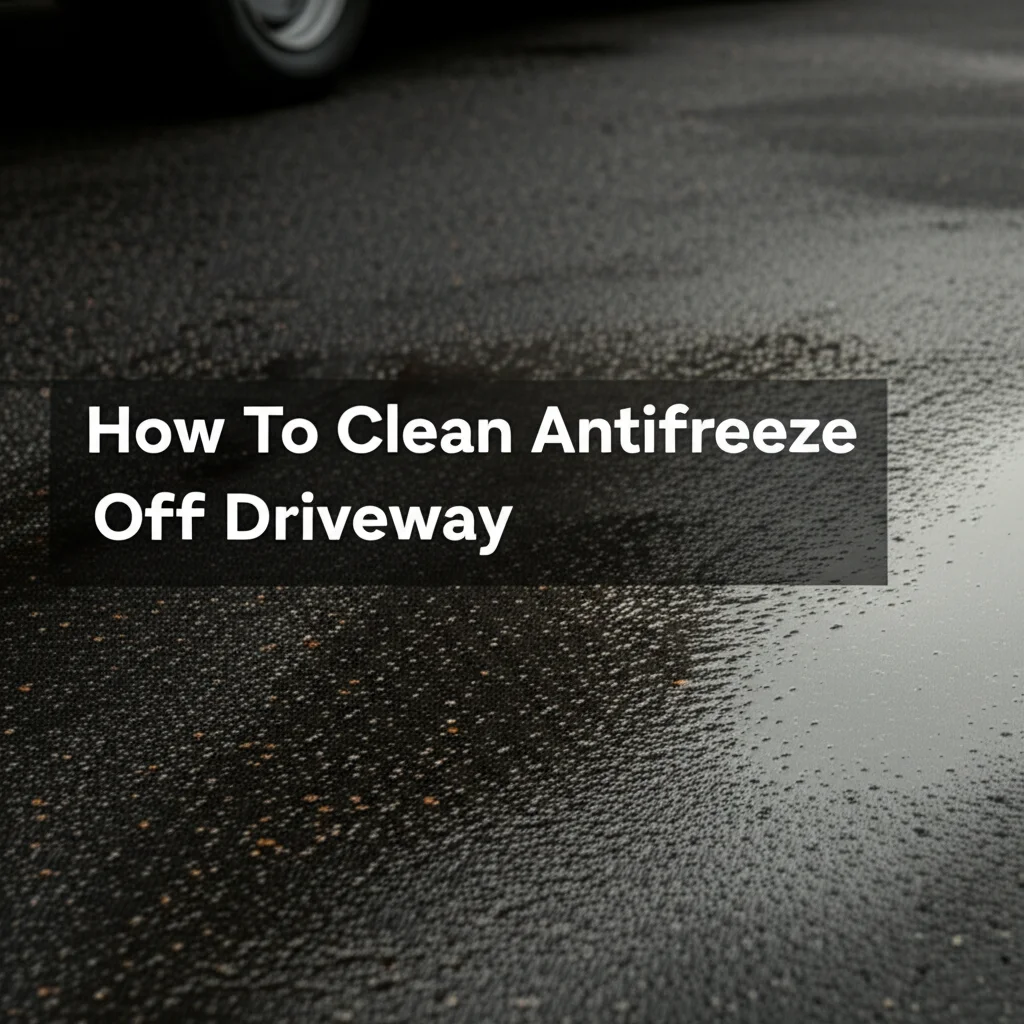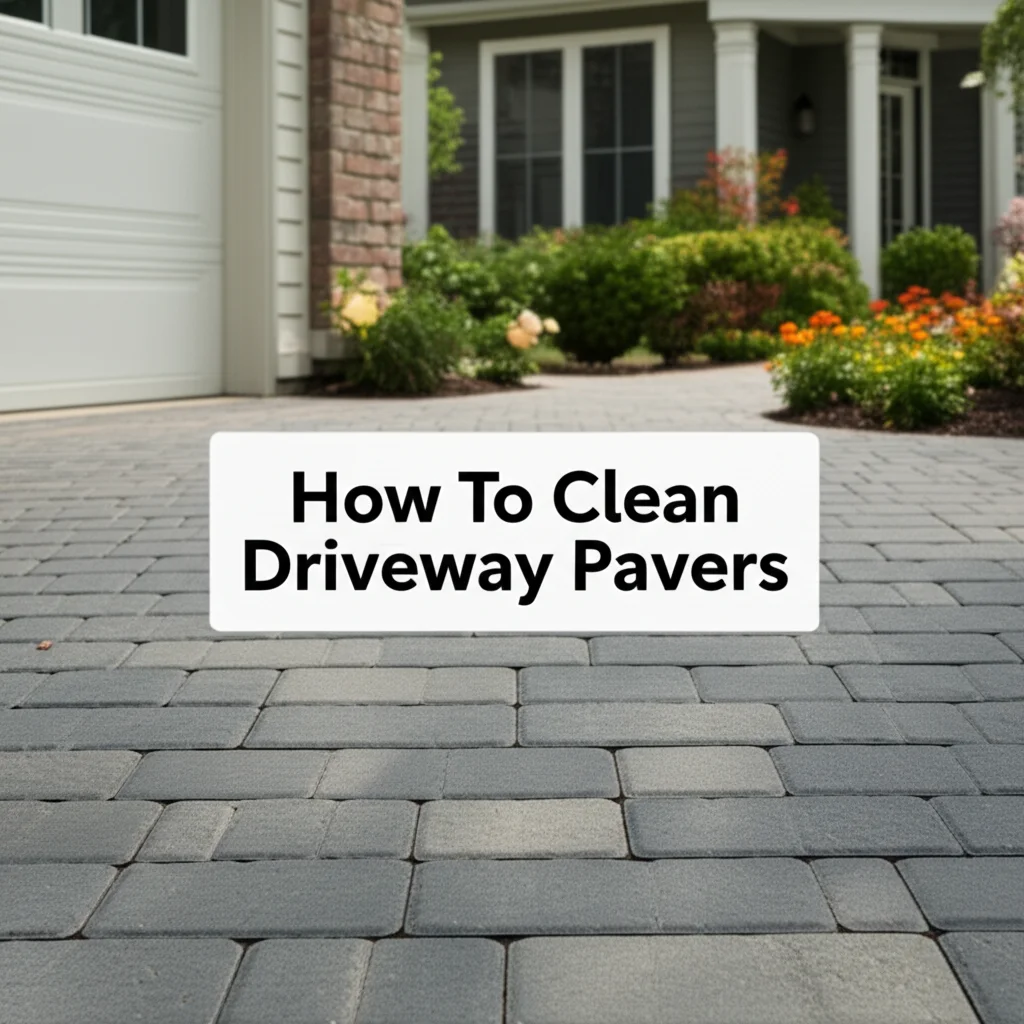· Todd Martin · Home Maintenance · 10 min read
How To Clean Antifreeze Off Driveway

Cleaning Antifreeze Off Your Driveway Safely
Have you ever spotted a bright, colorful puddle on your driveway? It is often antifreeze, a vital car fluid. However, this liquid poses a significant risk to pets and the environment. You need to clean it up quickly. I understand the concern when you see such a spill. It is important to know how to clean antifreeze off driveway surfaces properly.
This guide provides simple steps. I will share the tools you need and safety tips to protect everyone. We cover immediate spill cleanup and how to tackle old stains. You will learn about eco-friendly cleaning methods too. My goal is to help you restore your driveway while keeping your home safe.
Takeaway:
- Act fast to contain and clean antifreeze spills immediately.
- Always use personal protective equipment during cleanup.
- Use absorbent materials first, then apply cleaning agents.
- Consider eco-friendly options for less harmful cleanup.
- Prevent future spills through regular vehicle maintenance.
To clean antifreeze off a driveway, act quickly to contain the spill. Then, use absorbent materials like kitty litter or sawdust. Afterward, scrub the remaining stain with a stiff brush and a mixture of dish soap, baking soda, and water, rinsing thoroughly.
Understanding Antifreeze Spills: Why Immediate Action Matters
Antifreeze, also known as engine coolant, is crucial for your car’s engine. It stops the engine from freezing in winter and overheating in summer. Spills happen often during vehicle maintenance or from leaks. These spills appear as brightly colored liquids, usually green, pink, or orange. Do not let the color fool you.
Antifreeze is highly toxic. It contains ethylene glycol, which is very dangerous if ingested. Pets, especially dogs and cats, are attracted to its sweet taste. Even a small amount can cause kidney failure or death in animals. This is why cleaning antifreeze off driveway surfaces without delay is critical.
The substance also harms the environment. It can seep into soil and groundwater. This pollutes local ecosystems. Acting quickly minimizes these risks. Immediate cleanup protects your family, pets, and the surrounding nature.
Safety First: Protecting Yourself, Pets, and the Environment
Before you begin to clean antifreeze off your driveway, safety must be your priority. Antifreeze is hazardous. You need to take precautions to protect yourself. It is also important to protect pets and the environment.
Always wear personal protective equipment (PPE). This includes chemical-resistant gloves, safety glasses, and old clothes. Avoid direct skin contact. Ensure good ventilation if the spill is in an enclosed area. Never try to clean up antifreeze barefoot or with open-toed shoes.
Keep pets away from the spill area at all times. Their curiosity could lead to tragic outcomes. Consider using pet-friendly antifreeze (propylene glycol-based) in your vehicle to reduce risk, although these still require cleanup. Proper disposal of contaminated materials is also essential. Do not rinse large spills into storm drains. Collect all waste and dispose of it according to local hazardous waste guidelines.
Essential Tools and Materials for Antifreeze Cleanup
Gathering your tools before you start makes the job easier. Having everything ready helps you act quickly. This is important when you need to clean antifreeze off a driveway. You probably have many of these items already at home.
First, you will need absorbent materials. Clay kitty litter, sawdust, or sand work well. These absorb the liquid and prevent it from spreading. Next, prepare your cleaning solution. Dish soap is effective, but you can also use baking soda or a commercial concrete cleaner. A stiff-bristled brush or push broom will help with scrubbing.
You will also need buckets of water for rinsing. A garden hose is ideal for larger areas. For personal protection, grab your rubber gloves and safety glasses. Finally, have sturdy garbage bags ready for disposal. These simple items will get your driveway looking clean and safe again.
Step-by-Step Guide: Cleaning Fresh Antifreeze Spills
Cleaning a fresh antifreeze spill needs quick action. The faster you act, the less damage it causes. I will walk you through the process for a new spill. This method aims to absorb the liquid and then clean the remaining residue.
Start by containing the spill. Create a barrier around the liquid using an absorbent material like sand or kitty litter. This stops the antifreeze from spreading further across your driveway. Once contained, liberally cover the entire spill with more absorbent material. Let it sit for at least 15-30 minutes. This allows the material to soak up as much antifreeze as possible.
After the absorption time, sweep up the saturated absorbent material. Place it carefully into a heavy-duty plastic bag. Seal the bag tightly. Now, prepare your cleaning solution. Mix warm water with a generous amount of dish soap. You can also use a mixture of baking soda and water to clean many tough stains, similar to how you might clean other household spills. Apply this solution directly to the stained area. Scrub vigorously with a stiff brush. For stubborn concrete stains, consider techniques similar to how you would clean paint off concrete or clean gas off concrete from hard surfaces. Rinse the area thoroughly with a garden hose. Repeat scrubbing and rinsing if any residue remains.
Tackling Dried Antifreeze Stains and Residue
Dried antifreeze stains can be tougher to remove. They often leave a colorful, sticky residue on your driveway. But do not worry, these stains are not impossible to clean. The key is to break down the dried substance.
First, you might need to scrape off any thick, dried layers. Use a dull scraper or a trowel for this. Be careful not to damage the driveway surface. Once the bulk is removed, apply a strong degreaser or a commercial concrete cleaner. Follow the product instructions carefully. Let it sit for the recommended time to penetrate the stain.
For an effective scrubbing method without special equipment, consider learning how to clean driveway without pressure washer techniques. Scrub the stain vigorously with a stiff wire brush or a push broom. Work the cleaner into the concrete pores. Rinse the area completely with water. You may need to repeat this process several times for older, tougher stains. Persistence pays off when removing these dried residues.
Eco-Friendly and Alternative Antifreeze Cleaning Solutions
Concerned about harsh chemicals? There are several eco-friendly ways to clean antifreeze off your driveway. These methods are safer for the environment and often just as effective for smaller spills or lighter stains. My go-to options involve common household items.
One popular and effective solution is a baking soda paste. Mix baking soda with a little water to form a thick paste. Apply this paste generously over the antifreeze stain. Let it sit for several hours or even overnight. Baking soda is a natural absorbent and mild abrasive. It helps lift the stain from the concrete. Then, scrub the area with a stiff brush and rinse thoroughly with water.
Another excellent alternative is a mixture of white vinegar and water. Vinegar’s acidic properties can help break down the antifreeze. Combine equal parts white vinegar and water. Apply this solution to the stain, let it sit for 15-30 minutes, then scrub and rinse. For more tips on combining these effective cleaners, learn how to clean with vinegar and baking soda. Enzyme-based cleaners are also available. These products use beneficial microbes to break down organic stains, offering an effective and environmentally conscious approach. Always choose solutions that align with your environmental values.
Preventing Future Antifreeze Spills on Your Driveway
Prevention is always better than cleanup. Taking steps to avoid antifreeze spills keeps your driveway clean and your home safe. I find that proactive maintenance is the best approach. It saves you time and effort in the long run.
Regularly check your vehicle for leaks. Look under your car periodically, especially after it has been parked for a while. A visual inspection can spot drips before they become major spills. Pay attention to the color of any fluid you see. If you notice a leak, address it immediately. Do not delay repairs.
When you perform car maintenance yourself, use a drip pan. Place it under the engine when you are adding or draining fluids. This simple step catches any accidental drips. Always dispose of used antifreeze properly. Never pour it down a drain or onto the ground. Take it to an authorized recycling center or a hazardous waste facility. By following these simple practices, you can significantly reduce the chances of needing to clean antifreeze off your driveway again.
FAQ Section
1. How dangerous is antifreeze to pets? Antifreeze is highly dangerous for pets. It contains ethylene glycol, which is toxic. Pets are attracted to its sweet taste. Even a small amount can cause severe kidney damage or be fatal. Always keep pets away from any spills. Clean up thoroughly and quickly to prevent ingestion.
2. Can I use a pressure washer to clean antifreeze? Yes, you can use a pressure washer for rinsing after scrubbing. However, avoid directly spraying antifreeze with a pressure washer as a primary cleaning method. This can spread the toxic liquid and push it deeper into concrete pores or into storm drains. First, absorb and scrub the spill. Then, use a pressure washer to rinse the cleaned area.
3. What if the antifreeze spill is very large? For very large antifreeze spills, or if the spill is actively leaking from a vehicle, it is best to call a professional hazmat cleanup service. Do not attempt to handle extremely large spills yourself. These professionals have the right equipment and training to safely contain and dispose of hazardous materials.
4. Will antifreeze permanently stain my driveway? Fresh antifreeze spills are generally not permanent if cleaned promptly. Older, dried spills can leave a visible stain. However, with persistent scrubbing and the right cleaning agents, you can significantly reduce or completely remove most antifreeze stains from concrete driveways.
5. How should I dispose of used antifreeze and contaminated materials? Never pour used antifreeze or contaminated absorbent materials down drains or onto the ground. These are considered hazardous waste. Collect all waste in sealed, heavy-duty bags or containers. Take them to your local hazardous waste collection facility or a designated recycling center. Check with your local municipality for specific disposal guidelines.
6. Are there specific products for antifreeze stain removal? Yes, several commercial products are designed for oil and fluid stain removal from concrete. Look for automotive degreasers or dedicated concrete cleaners. Always read product labels carefully and follow the instructions. Many cleaners are effective at breaking down the components of antifreeze.
Conclusion
Cleaning antifreeze off your driveway is an important task. It protects your family, pets, and the environment. I hope this guide gives you confidence to tackle any spills. Remember to act quickly and always prioritize safety. Use absorbent materials first, then follow up with effective cleaning solutions like dish soap, baking soda, or commercial degreasers.
Preventing future spills is just as vital. Regular vehicle checks and proper disposal habits make a big difference. By taking these steps, you maintain a clean and safe home environment. Your driveway will look its best, and you will have peace of mind. Keep up with vehicle maintenance to help prevent future antifreeze spills on your driveway.
- antifreeze spill cleanup
- driveway cleaning
- concrete stain removal
- coolant removal
- pet safety





